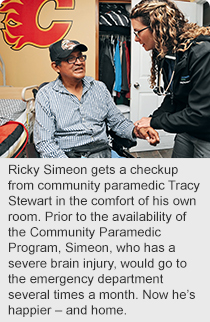
October 21, 2015
Story by Lisa Sutherland; photo by Paul Rotzinger
The Community Paramedic Program has made a massive change for the better in Ricky Simeon’s life by keeping him at home and out of the emergency department.
The Calgary man visited the emergency department almost 25 times between October 2014 and February 2015. Each visit resulted in several hour-long waits, several day-long admissions and, at times, several week-long admissions.
The 58-year-old has a traumatic brain injury that makes it difficult for him to verbalize how he feels. It has also left him unable to walk and with multiple health concerns.
But since the Community Paramedic Program became available to him in March, through a partnership between Alberta Health Services (AHS) and Persons With Developmental Disabilities, Simeon hasn’t been to emergency once.
“The Community Paramedic Program now provides people with complex health conditions immediate access to health services by visiting patients in their homes, doing assessments and providing front-line care previously unavailable outside of a hospital,” says Ryan Kozicky, AHS Manager of Community Paramedicine.
“Community paramedics also liaise with family physicians and specialists, improving continuity of care which can be lost with an emergency department visit.”
For the past eight years, Simeon has been living in a fully accessible group home in northwest Calgary, operated by the Universal Rehabilitation Service Agency.
Even though he’s in a wheelchair, Simeon enjoys a great deal of independence and loves getting out every day and venturing around the city.
However, prior to accessing the Community Paramedic Program, Simeon became increasingly apprehensive of telling his caregivers when he wasn’t feeling well for fear he’d have to go back to the emergency department ... again.
But that has all changed.
“Ricky knows the paramedics and trusts them, so he no longer waits until his health complaints are so severe that they require treatment in emergency,” says Tara Zyla, Director of the Universal Rehabilitation Service Agency.
“The Community Paramedics are amazing with our clients and can often treat them in the comfort of their home, set up an appointment for them and have the client get on with their day.”
There are more than 20 community paramedics currently providing health care services in 70 sites across the province. These include supportive living, long-term care, lodges and personal care homes.
Community paramedics also provide health care services in private residences when the patient’s physician or medical clinic is directly involved.
This year, it’s expected that the program will eliminate approximately 4,500 ambulance visits to hospitals.
Community paramedic Tracy Stewart says it adds up to care that’s making a big impact on patients.
“I love being a part of a team that is able to treat people in the comfort of their own homes, most times eliminating the need for a hospital visit,” Stewart says. “It’s really improving their quality of life."